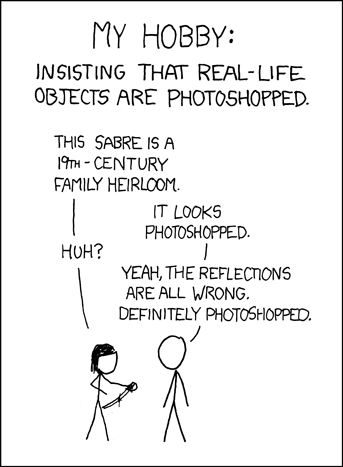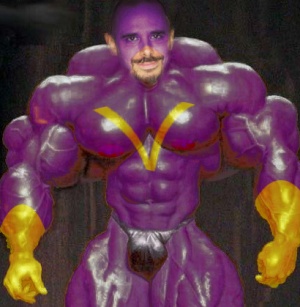331: Photoshops
| Photoshops |
 Title text: When I look into your eyes, I see JPEG artifacts. I can tell by the pixels that we're wrong for each other. |
Explanation
This is another comic in the My Hobby series. This whole comic, including the title text, is a play on the then-popular internet meme "This Looks Shopped". It may also be making fun of how everything and anything you find on the internet has someone insisting that it's 'fake' or 'photoshopped', regardless of whether it's true in actuality. Adobe Photoshop is a popular image manipulation tool used to manipulate photographic images and for drawing. Of course, Photoshop and similar tools like Paint Shop Pro can only be used for imagery, not for real life objects.[citation needed]
The title text contains the second part of the internet meme, the complete text of which is: "THIS LOOKS SHOPPED / I CAN TELL FROM SOME OF THE PIXELS AND FROM SEEING QUITE A FEW SHOPS IN MY TIME." JPEG is an image compression algorithm that works by finding frequencies in blocks of 8x8 pixels and saving that instead of the original pixels. This works remarkably well, but sometimes leaves artifacts that can be seen when zooming in enough. The iris of an eye contains all kinds of odd colored spots - and there's not a JPEG algorithm in sight.
Transcript
- [Megan holds a sword while Cueball looks on.]
- My hobby: Insisting that real-life objects are photoshopped.
- Megan: This sabre is a 19th-century family heirloom.
- Cueball: It looks photoshopped.
- Megan: Huh?
- Cueball: Yeah, the reflections are all wrong. Definitely photoshopped.
Discussion
While many alarming or suspiciously interesting pictures (and videos) have later proven to be 'shopped', I believe that Randall is commenting on the abysmal existence of a certain kind of person who cries foul on *any* picture that isn't straightforward.
They usually profess to be Photoshop experts and point out various 'defects' in the photo that 'prove' it has been manipulated.
This is just a (hopefully unconscious) attempt to appear more cynical, more intelligent and harder to fool than everybody else who has ignored the glaring evidence.
What makes it simultaneously amusing and annoying is that usually the commenter is patently, completely and obviously wrong - the image has in fact captured a real occurrence.
- Yes, like this pic of me from back then: ...which is clearly, completely natural. —Kazvorpal (talk) 15:42, 9 November 2019 (UTC)
The original examples that come to mind are the Apollo 11 photographs from the surface of the moon, but the internet abounds with such. -- StephenP 108.162.219.223 18:28, 17 December 2013 (UTC)
To be entirely fair, with the advent of 3D printers, it will become possible to "shop" real-life objects. 108.162.218.101 00:03, 10 February 2014 (UTC)
- I'll just leave this here: https://www.indiegogo.com/projects/new-matter-mod-t-3d-printing-for-everyone Brettpeirce (talk) 13:48, 29 May 2014 (UTC)
- This is already done with plastic surgery, although to a more limited degree, of course. All other physical alterations widely available to the public used on existing objects (that come to mind) are for practical means, such as fixing a refrigerator172.68.46.11 19:35, 20 December 2016 (UTC)
Predicting a resurgence of this comic/dynamic with the advent of "looks AI generated". Reminds me a bit of 1306: Sigil Cycle in that there's something of an arms race between awareness of what makes something "look fake" and the fakery technology itself becoming able to fake those details. 172.70.230.197 (talk) 16:32, 30 January 2023 (please sign your comments with ~~~~)
- Huh. Meant to say that myself, but it seems someone did it first. 172.68.7.206 (talk) 02:12, 25 April 2025 (please sign your comments with ~~~~)
 Add comment
Add comment

